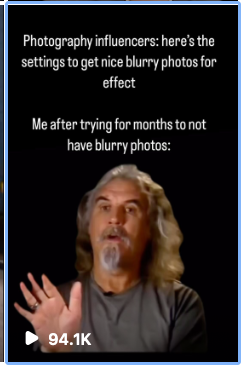Different Strokes26 July 2024 | 8:15 am
Matt Birchler writing about Math Notes in iPadOS 18:
…while I can academically understand why they’re so impressive and that some people will get massive use out of them, they aren’t valuable to me, so they don’t move the needle at all in terms of me being able to close up some of the friction points I have with using an iPad for all the things I’d love to do with any iPad.
I’ve missed so much in the last few months, especially around the new iPad and iPadOS features. In my continued search for a new one, I am going back and reading old reviews. This bit from Matt stuck out for me, and being able to see the usefulness of features to other people is such a transferable skill to have.
There’s a tendency to rubbish anything you don’t immediately see as useful. I once had an interaction on Reddit that thankfully I can’t remember it word for word; however, they were claiming that updates to the Sony A7vi to include a screenreader and other accessibility features are pointless. They couldn’t see that other people might make use of features that they didn’t need (and also put on show their ableist attitude).
This happens with almost everything, we all have a tendency to rubbish features and think we could all do a better job, when the reality is we probably couldn’t. Except when it comes to managing the England football team.
Producing Slop22 July 2024 | 1:00 pm
For the past few weeks, I’ve been producing slop. Not because I want to. Merely because everyone tells me I must in order to succeed on the internet.
Content slop is a strange term, but it describes the mass-produced, often AI-generated, surface-level content that constitutes a large portion of the internet now. It has three characteristics, but I stick to Ryan Broderick’s first outlining feature, which states that “to the user, the viewer, the customer, it feels worthless.”
Anything made purely for internet points and offering no value whatsoever is slop. It constitutes a massive portion of YouTube, streaming apps, social media platforms, and unfortunately, a large portion of the web now. So why have I been creating it, you might ask? Well, because I wanted some of those sweet dopamine hits everyone craves, of course. While working to increase the level of my Instagram account after deleting it a couple of years ago, it’s tough going, and every bit of advice on how to grow your account suggests you publish reels. So I began hating myself and producing slop.

I couldn’t do it to myself for very long. Barely a few weeks of publishing meme-like reels led to thousands of views and loads of likes, which for some would be a considerable win. Yet, the metric I wanted to push, my follower count, barely moved. Views are worthless unless they lead to something: buying your product, visiting your links, or perhaps following your account. The percentage of people who take such actions is so minute that the old tricks do not work any more.

Platforms like TikTok and Instagram only serve those who produce entertainment. They exist for no other reason than to serve you slop interlaced with adverts and keep you watching. They are self-serving companies that care about the creators only as much as they need to. Not only that, but they have a way of convincing us that they care about creators when, in fact, the only metric that matters is slop production. As long as you produce slop that can be served to other people, they can keep making money.
Granted, my slop experiment wasn’t done to the best of my abilities; my slop was particularly poor slop. Mosseri, head of Instagram, stated himself that you’re not entitled to exposure and reach; you just need to produce different slop. Had I offered a bit more value to people, perhaps they would have followed me for more slop production, but I doubt it. I realised rapidly that modern social algorithms have removed the need to follow anyone to see the slop that resonates with you. So there’s no point in bothering after all.
Why The RCS Hate?22 July 2024 | 9:03 am
John Gruber joining two unconnected things together and predictably developing from it a pro apple stance (via Birchtree):
But the argument against RCS is strong and simple: it doesn’t support end-to-end encryption. The only new messaging platforms that should gain any traction are those that not only support E2EE, but that require it. Messaging and audio/video calls should only work through E2EE. That’s true for iMessage and FaceTime.
I try not to read, nor comment on, Daring Fireball things any more because the take from them is so clouded in pro-Apple rhetoric that it’s often difficult to see the wood for the trees. However, after Matts post about the article, I decided to read it for myself and boy what a weird take.
RCS is merely a step forward for SMS and MMS, it never promised encryption, and I have my doubts that any carrier would support it even if it did. Apple presently sticks to routing RCS through carrier defaults. Google offers encryption over RCS by turning them into Google Messages, meaning “your chat conversations automatically upgrade to end-to-end encryption”. I am sure that Apple could offer something similar, but considering their RCS implementation is essentially an FU to the EU, they chose not to.
However, we are going off-topic a little. Whilst I agree with John’s opinion that any new implementation of messaging should be e2e encrypted, he completely skirts around the fact that Apple could offer this because it doesn’t fit into his narrative. Instead, he suggests sending all of your messaging through a third-party close system — mentioning WhatsApp specifically. Taking such a positive stance on privacy and then suggesting the use of Meta products is more than a little strange.